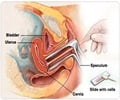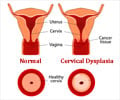Inexpensive DNA-based test for human papillomavirus (HPV) can be used effectively in low- and middle-income countries, where the prevalence of cervical cancer is high due to lack of screening resources.

TOP INSIGHT
Inexpensive DNA-based test for human papillomavirus (HPV) can be used effectively in low- and middle-income countries, where the prevalence of cervical cancer is high due to lack of screening resources.
Read More..
"We have shown that cervical cancer screening can be implemented in low-resource settings using this method, and that women are very interested and engaged in testing and follow-up clinic visits when necessary," says Tsongalis. "This study also identified something we were not expecting and that is a very significant difference in the types of high-risk HPV that we were detecting."
Such findings could mean profound implications for vaccination programs. "The causes of cervical cancer, while viral in nature, are not always the same type of virus and that could impact aggressiveness of the disease, vaccinations, and therapies," says Tsongalis.
The team would like to use their findings to guide studies of actual cervical cancer tissue and also to formulate therapeutic vaccine trials. "Being able to screen individuals who have never been tested before and studying the impact of the testing on their healthcare as well as our understanding of the biology of the disease is most exciting," says Tsongalis.
Source-Eurekalert
 MEDINDIA
MEDINDIA




 Email
Email









